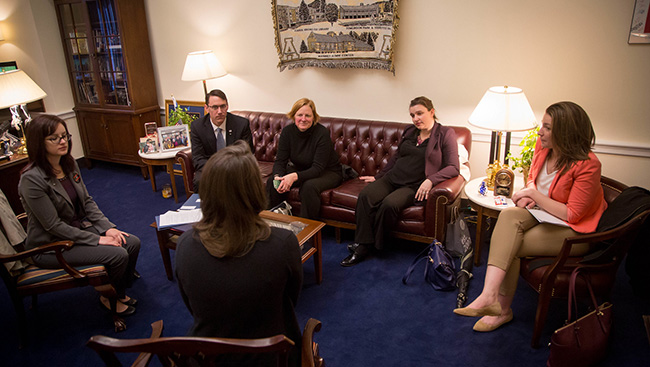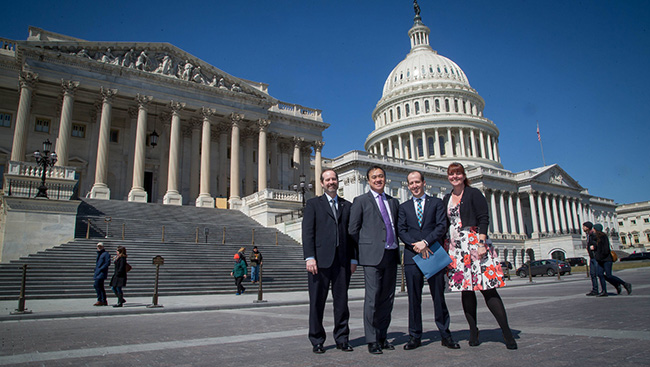Science policy is shaped by the information made available to your representatives, so establishing relationships with them early on in their terms can help set the tone for what you accomplish together in the future.
This webinar will provide the “how-to” for connecting with your congressional delegation. Advocates with experience in research and on the Hill will share powerful strategies for communicating with policymakers to build trust and serve as a reliable resource.
After this webinar, your advocacy toolkit will include:
- Effective traditional and nontraditional techniques for building relationships with elected officials.
- A wide variety of communication methods you can use to reach out to your policymakers.
- Stories from people in neuroscience who mastered the art of relationship building with their congressional delegation.
Whether you want to form relationships with new members of Congress or engage long-standing members in new ways, watch this webinar to learn how you can work toward your shared goals.
Speakers
Joyonna Gamble-George, PhD
Joyonna Gamble-George is a former Early Career Policy Ambassador (ECPA) for SfN. She is also a senior scientific officer for SciX, LLC, a biotech Internet of Things software applications and device development company. She earned her BS in biochemistry and biology from Xavier University of Louisiana, her MHA in health administration from the University of South Florida College of Public Health, and her PhD in neuroscience from Vanderbilt University. She recently completed postdoctoral training at the University of Florida, where her research focused on the effects of methamphetamine on bidirectional neuron-microglia communication in the human brain and animal models of HIV-1 infection. Her previous research efforts concerned potential drug therapies for Alzheimer's disease, the molecular and synaptic consequences of drug abuse and addiction, and endocannabinoid signaling in affective disorder pathology using mouse models.
Kristin Anderson
Kristin Anderson is a PhD candidate at Lehigh University. Anderson studies how genes encoding for protein modulators of the cholinergic system affect nicotinic acetylcholine receptors and behaviors such as fear, anxiety, and learning in mouse-to-human correlative studies. As a science advocate, Anderson engages the public as well as congressional leaders to promote robust and sustained science funding. Through her refined communication techniques, she connects the dots between science funding and how the resulting research benefits society. She has attended SfN’s Hill Day and the Rally for Medical Research on Capitol Hill, attends local town hall meetings with Congress, regularly writes advocacy related news articles, and has brought science and advocacy to the public through science fairs and music festivals.

Megan Anderson Brooks, PhD
As a vice president at CRD Associates, Megan Anderson Brooks focuses on science and regulatory policy related to basic and clinical scientific research, personalized medicine, federal oversight of diagnostics and biotech devices, and patient-specific issues related to access and patient-centered treatment development. On behalf of clients, she assists in the development and implementation of policy strategies, coordinates congressional briefings and public policy symposiums, organizes client advocacy days on Capitol Hill, and engages in direct lobbying. She was a neuroscientist for more than 10 years, during which she conducted research on brain health and the neural mechanisms of learning and memory. She previously worked for the Society for Neuroscience on issues related to research replicability and to develop grassroots advocacy activities. She holds a PhD in neuroscience from Rutgers University and was awarded a fellowship from the Eagleton Institute of Politics.

Moses V. Chao, PhD
Moses V. Chao is professor of cell biology, physiology, and neuroscience and psychiatry at the New York University School of Medicine. Chao received his BA from Pomona College and PhD from UCLA in biochemistry. His laboratory defined the genes encoding the NGF receptor and his research interests are in defining mechanisms used by trophic factors to change synaptic plasticity. Trophic factors are responsible for neuronal survival, learning and memory, pain, obesity, anxiety and counteracting neurodegeneration. He served as Senior Editor for the Journal of Neuroscience for eleven years and is currently a member of the Scientific Advisory Boards for the Simons Foundation, Target ALS, and the Pershing Square Foundation. He also served on the Scientific Boards of the Christopher Reeve Paralysis Foundation; the Glaucoma Research Foundation; St. Jude’s Cancer Center; the Crick Institute, the Max Planck Institute, the Vollum Institute and the New York Stem Cell Foundation. Chao was the President of the Society for Neuroscience for 2012.









